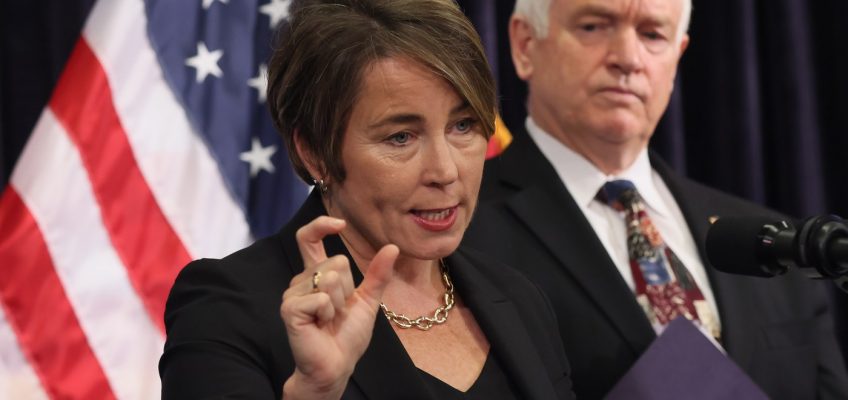Gov. Maura Healey does not have to amend or repeal the state’s “right to shelter” law.
All she needs to do is enforce it.
The law as written, and passed forty years ago, was never intended to house and feed the explosion of migrants from around the world storming into Massachusetts.
It was passed and signed into law by liberal Democrat Gov. Michael Dukakis in 1983 to deal with the relatively small number of homeless families and pregnant women who were residents of Massachusetts, not residents of other states or countries.
But the law has not been interpreted or enforced the way it was written. Instead, progressives have proudly waved it as a banner of compassion and an invitation to migrants from around the world to come to Massachusetts where they will be cared for.
Liberal Massachusetts is the only state in the union with such a law.
The word eventually went out that Massachusetts was a soft touch. So the mostly illegal immigrants came, and are coming, to the point that Healey had to call a state of emergency and bring out the National Guard to help deal with the influx of all the foreigners making their way to Massachusetts.
The situation has gotten so bad, and so costly, that Healey last week announced that the state can no longer guarantee shelter or housing for any more arrivals.
She made no mention of the social impact the immigrants have had on the communities where they are being housed in motels, or what will happen to immigrants who keep on coming.
Currently there are some 7,023 immigrant families in the state’s shelter/welfare system, or some 23,000 people. Of the number, 3,300 families are living in motels and hotels and the rest are in shelters.
Healey last week announced that the state has run out of shelter space, service providers or funding to continue housing immigrants. On Nov.1 it will not add any more shelter units and limit the number of families housed in the system.
The Healey administration will soon have spent all the $325 million appropriated in January to deal with the immigrant crisis. Healey, meanwhile, has requested another $250 million from the Legislature.
“This level of growth is not sustainable,” Healey said. Then, in a mixed message, she said, “We are not ending the right to shelter law. We are being very clear, though, that we are not going to be able to guarantee placement to those who are sent here after the end of the month.”
Healey, however, doesn’t have to end the shelter law, she just needs to enforce the way it was written to cover homeless Massachusetts residents, not outsiders.
The 1983 law, in defining a resident, states that “any such person who enters the Commonwealth solely for the purposes of obtaining such benefits under this chapter shall not be considered a resident.”
The law also provides help for pending homeless families with money for rent, utility bills, home heating bills, moving expenses and furniture storage, none of which would appear to apply to illegal immigrant coming to Massachusetts from countries around the world.
It is good, but probably futile, to keep asking President Biden for financial aid to deal with the immigration problem.
“We need everyone to understand that we are entering a new phase of this shelter challenge,” Healey said. “Massachusetts will continue to rise to this challenge. That’s who we are. But I want there to be no doubt. This is a federal problem that demands a federal solution.”
For Biden, to come up with billions in federal money for Massachusetts and other states burdened with illegal immigrants, is to admit he created the problem in the first place by opening the borders and allowing people in who do not belong here.
Healey would have been better off if she demanded Biden shut down the border.
It is just too bad that Healey is still not attorney general.
That way she could sue Joe Biden for not enforcing Donald Trump’s strict border laws – the way she used to sue President Trump for enforcing them.
For Democrats, though, the law, like beauty, is in the eye of the beholder.
Peter Lucas is a veteran Massachusetts political reporter and columnist.
A U.S. Border Patrol agent directs asylum-seekers waiting between the double fence along the U.S.-Mexico border near Tijuana, Mexico earlier this year. (AP Photo/Denis Poroy, file)


Leave a Reply